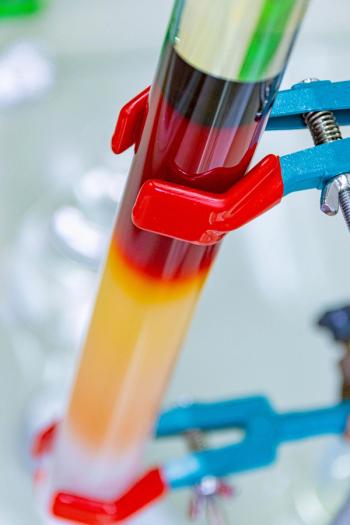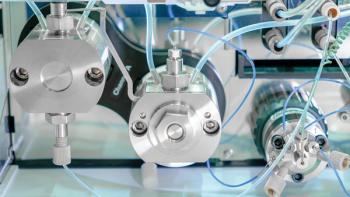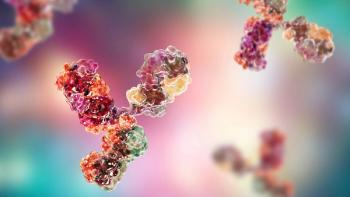
- BioPharm International-09-01-2019
- Volume 32
- Issue 9
What’s New in Manufacturing: Process Chromatography
The latest advances in process chromatography include pre-packed chromatography columns, process characterization kits, fast protein liquid chromatography systems, and mixed-mode chromatography resins.
Advances in process chromatography are necessary for accuracy and productivity in biologics manufacturing. The following products promise to improve and enhance the reliability of process chromatography.
Pre-packed chromatography columns
The ReadyToProcess chromatography column with 600 mm inner diameter is the latest addition to the ReadyToProcess chromatography column line from GE Healthcare. The pre-packed, ready-to-use column offers enhanced flexibility and productivity in clinical and commercial manufacturing by eliminating the need for column preparation, packing, and validation procedures, according to the company.
Introduced to the market in July 2019, the ReadyToProcess 600 mm inner diameter chromatography column comes equipped with bed heights of 100–250 mm. The column is compatible with a variety of chromatography resins including those used for monoclonal antibody (mAb) purification, viral vectors, plasmids, recombinant proteins, and more.
Validation columns from GE Healthcare involve pre-packed scale down Tricorn 10/200 columns for process development and process validation. The columns can be run on chromatographic systems, including the company’s own ÄKTA chromatography systems, and are prepacked to save time, improve reproducibility, and eliminate the need for packing expertise, the company says.
The columns come equipped with a bed height of 20 cm and an inner diameter of 10 mm. MabSelect PrismA, MabSelect SuRe, MabSelect SuRe LX, Capto S ImpAct, Capto Q, Capto SP ImpRes, and Capto Adhere prepacked resins are available for use with these columns.
Chromatography process characterization kit
GE Healthcare also introduced Process Characterization Kits to its catalog in July 2019. The kits provide access to knowledge from resin development projects, enable risk assessments and process characterization of resin variability, and interplay with process parameter impact on process performance and critical quality attributes. According to the company, this aids in the understanding of process parameters and raw material attributes, which are key to developing successful control strategies and
productive processes.
The kits come with three lots of a given resin with different ligand densities (high, center, and low) and are available for Capto S ImpAct, Capto SP ImpRes, Capto adhere, Capto adhere Impres, Capto MMC, Capto MMC ImpRes, Capto Phenyl, Capto Phenyl ImpRes, and Capto Butyl ImpRes resins.
Soon-to-be-released chromatography products
ÄKTA go is GE Healthcare’s most recent addition to the ÄKTA chromatography systems portfolio. Developed for automated chromatography descended from fast protein liquid chromatography (FPLC) technology, the system supports routine lab-scale protein purification for affinity, size exclusion, and ion
exchange chromatography.
With a flow rate range of 0.01 to 25 mL/min, an operating pressure of 0 to 5 MPa (50 bar, 725 psi), pressure, ultraviolet, conductivity, and pH monitors, and dimensions of 335 × 482 × 464 mm without accessories, the ÄKTA go is designed to simplify method creation, achieve desired purity with ease, and make the most of bench space in crowded laboratories. The company plans to introduce the system to the market in October 2019.
Similarly, Repligen will introduce a new proprietary method of packing ceramic hydroxyapatite resin in its OPUS pre-packed columns in September 2019. The columns will be ≤45 cm in diameter with a range of configurable bed heights (5–30cm) and standard OPUS pre-packed column lead times will apply, according to the company.
Process chromatography resins
Originally introduced in 2016, the next generation of Pall Biotech’s CMM HyperCel mixed-mode resin is designed for large-scale drug manufacturing. The resin works to separate proteins with similar isoelectric points and hydrophobicity in broad conditions while using a pH from five to eight and conductivity up to 50 ms/cm.
The product is made up of a cellulosic matrix on which amino benzoic acid provides the ionic charge and hydrophobicity attached to it. It aids in process and product-related impurity removal and is particularly suitable for new engineered modality of monoclonal antibodies (mAbs) that are difficult to purify or recombinant proteins. The resin is also able to work from low to high conductivity and avoid the dilution needs required with cation exchange conditions.
The rebooted resin has an applied flow rate allowing three-to-four-minute residence time, a binding capacity of 100 mg/mL immunoglobulin G (IgG) at pH 5, 12 ms/cm, and > 60 mg/ml mAb at 25 ms/cm efficient ion exchange at high conductivity with no need for dilution or defiltration, the company states.
The Eshmuno CPS Resin from MilliporeSigma is a cation exchange resin that combines high dynamic binding capacity and separation efficiency in high-salt purification processes. According to the company, the resin’s salt tolerance allows for direct loading of high conductivity feed streams, which reduces costs, time, and manufacturing. It also features easy process development capabilities with bind and elute conditions and selection of process parameters.
The resin is composed of a base matrix, hydrophilic polyvinylether polymer, and a sulfonate cation exchanger. It also has a capture and intermediate polishing step of recombinant proteins, enzymes, antibody fragments, growth factors, etc. The product has a linear flow rate up to 500 cm/h (<3.0 bar net pressure) and a binding capacity of approximately 160 mg lysozyme/mL of gel.
GE Healthcare’s high resolution Capto HiRes Q and Capto HiRes S ion exchange chromatography columns are designed for high resolution separation for protein and nucleic acid purification or analysis. Prepacked in a Tricorn high-performance column, the resins are based on high-flow agarose with a particle size of 8 um.
The resins come with bed heights of 50 mm (5/50 column) and 100 mm (10/100 column); column inner diameters of 5 mm (5/50 column) and 10 mm (10/100 column); maximum pressure over a packed bed of 4.0 MPa; and an ionic capacity/ml packed resin of ~0.23 mmolCl-/mL resin for the Capto HiResQ and ~0.12 mmol H+/mL resin for the Capto HiRes S.
Article Details
BioPharm International
Vol. 32, No. 9
September 2019
Pages: 47-48
Citation
When referring to this article, please cite it as L. Lavelle, "What's New in Manufacturing: Process Chromatography," BioPharm International 32 (9) 2019.
Articles in this issue
over 6 years ago
Improving Oligonucleotide Analysisover 6 years ago
Dealing with particulates or aggregates in biologicsover 6 years ago
Putting Biopharma Stability Testing Under the Microscopeover 6 years ago
More Predictable Post-Approval Change Policy on Horizonover 6 years ago
Best Practices for Studying Stability in Biologicsover 6 years ago
Developing an Effective Contamination Control Strategyover 6 years ago
Biologics Continue to Grow and Create Outsourcing Opportunitiesover 6 years ago
Plan Now to Share Your Expertise in 2020over 6 years ago
Seeking Solutions for Large-Scale GMP Viral Vector ManufacturingNewsletter
Stay at the forefront of biopharmaceutical innovation—subscribe to BioPharm International for expert insights on drug development, manufacturing, compliance, and more.




